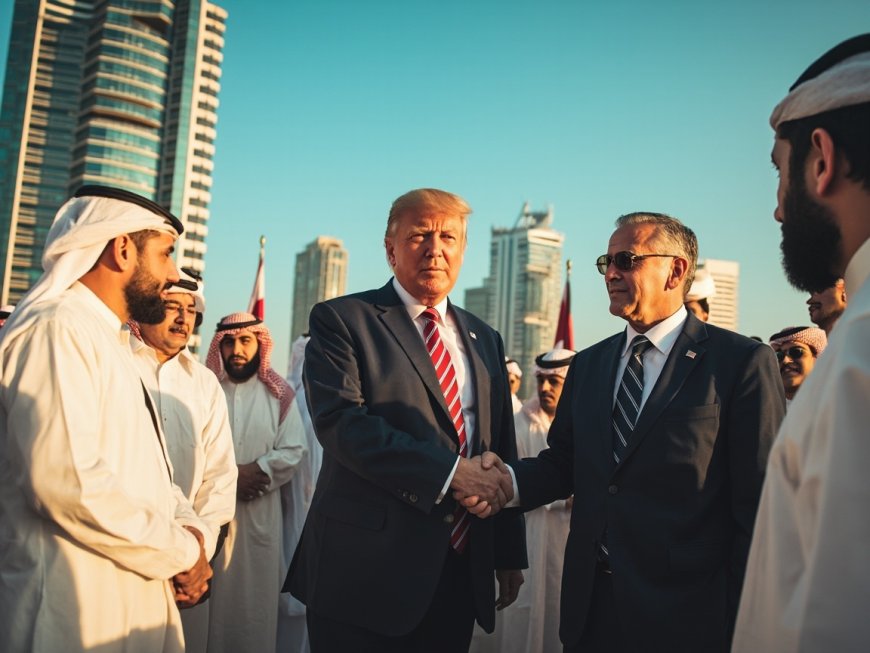Trump Shakes Up Middle East: Historic Deals and a New Regional Order
Donald Trump surprises with historic deals in the Middle East during his visit to the UAE, securing over $2.6 trillion in commitments and reshaping regional politics.

Washington D.C., May 15, 2025. — In a whirlwind diplomatic tour packed with economic agreements, bold declarations, and strategic moves, former President Donald Trump has once again positioned himself as a central figure in Middle Eastern geopolitics. Through a series of multi-trillion-dollar deals and diplomatic overtures, Trump’s visit is already being hailed by analysts as a potential game-changer for the region — and a political storm brewing back home in the United States.
A Whirlwind Tour with Monumental Results
Trump concluded his Middle East trip in the United Arab Emirates (UAE) after securing investment and economic cooperation pledges worth over $2.6 trillion. Among the headline-grabbing agreements was a pledge from Qatar for $1.2 trillion, including an order for more than 200 Boeing aircraft, the largest commercial aviation deal of its kind in the region.
The UAE also announced a $1.4 trillion framework agreement to invest in strategic sectors such as technology, renewable energy, and infrastructure development in partnership with U.S. companies. Regional media and Trump’s advisers alike have described the deals as “historic.”
Divided Reactions: From Admiration to Alarm
While conservative circles celebrate Trump’s return to international diplomacy as that of a “natural leader,” reactions from Democratic and diplomatic quarters were swift. Ned Price, former State Department spokesperson under Obama and Biden, told Axios that Trump possesses the rare ability to shatter traditional political barriers thanks to his “undisputed authority over the Republican caucus.”
Rob Malley, former Middle East security adviser for both Obama and Biden, was more direct: “It’s hard not to be simultaneously terrified of the potential damage he could do with such power and impressed by his willingness to shatter long-held geopolitical taboos.”
The Revival of the Abraham Accords
Another widely discussed development is the potential revival of the Abraham Accords, the groundbreaking agreements brokered during Trump’s presidency that normalized relations between Israel, the UAE, Bahrain, and other Arab nations.
Republican Senator Joni Ernst, a military veteran and Middle East expert, remarked in a televised interview that Trump is “leading the way toward greater integration, stability, and prosperity in the Middle East — something Biden’s administration failed to achieve.”
A New Ally on the Horizon: Saudi Arabia
Sources close to Trump’s delegation confirmed that advanced talks are underway to bring Saudi Arabia into the normalization process. Such a move would represent a seismic shift in Riyadh’s foreign policy and deliver a major geopolitical blow to Iran, which has long opposed the Abraham Accords and any rapprochement between Israel and Gulf states.
Iran and the New Nuclear Deal Conditions
In parallel with economic announcements, Trump used the tour to double down on his hardline stance against Iran. In public statements, he declared that the United States “will not tolerate Iranian nuclear development, ballistic missile proliferation, or terror financing.”
According to NBC reports, Iran has privately expressed willingness to negotiate a new agreement regarding its uranium enrichment program in exchange for sanctions relief. However, Trump made it clear that any negotiation must also address Tehran’s missile programs and its support for proxy groups like Hezbollah and Hamas.
“Trust but Verify”: Trump’s Strategy for Qatar and Other Players
When asked about Qatar’s historical financial links to groups like Hamas, Trump responded with his trademark pragmatism: “Trust but verify.” He emphasized that the United States will maintain a military presence in the region and will not hesitate to relocate assets if signs of covert support for extremist groups surface.
Domestic Political Fallout in the U.S.
The trip has also sent ripples through American domestic politics. In a heated election year where Trump is widely expected to run again, his assertive international maneuvers are fueling both fervent support and fierce criticism.
Republicans hail Trump’s ability to secure financial and strategic commitments of such unprecedented scale in record time, noting that no recent president has demonstrated similar diplomatic leverage in the Middle East.
Democrats, meanwhile, warn of the risks associated with emboldening authoritarian regional regimes and exacerbating tensions with Iran. They also caution against the long-term consequences of prioritizing transactional diplomacy over human rights and democratic reforms.
Redrawing the Diplomatic Map
Regardless of the controversy, Donald Trump’s Middle East tour marks a significant chapter in contemporary U.S. foreign policy. With record-breaking financial deals, high-stakes strategic negotiations, and a renewed diplomatic offensive, the former president has thrust himself back into the epicenter of global geopolitics.
Whether these actions will bring lasting peace and stability to one of the world’s most volatile regions or ignite new international tensions remains to be seen. What is certain for now is that Trump has once again managed to make himself the protagonist of the global stage.
What's Your Reaction?
 Like
0
Like
0
 Dislike
0
Dislike
0
 Love
0
Love
0
 Funny
0
Funny
0
 Angry
0
Angry
0
 Sad
0
Sad
0
 Wow
0
Wow
0

































